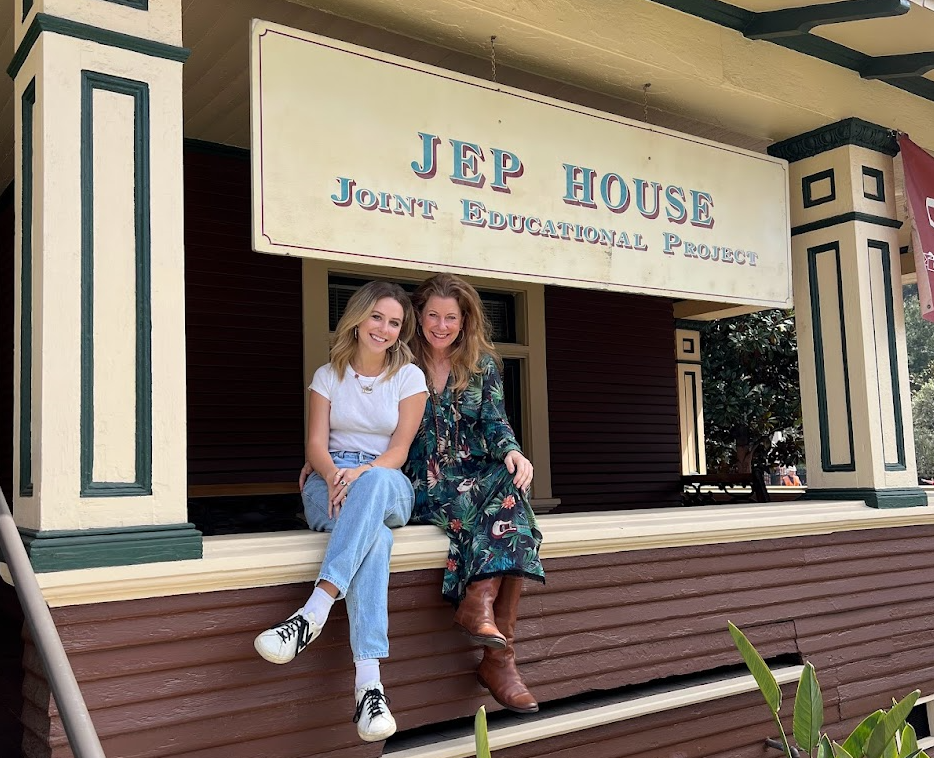Generations of JEP: A Mother-Daughter Journey of Service and Inspiration
by Kathrin Rising

JEP provides students with meaningful opportunities to serve and learn from the different communities surrounding the university. Students who want to take their involvement with JEP one step further can apply to become paid peer educators and help their fellow students navigate their JEP journey as so-called Program Assistants. This article features an interview with Dixie, a current program assistant at JEP, and her mother, Jessica Collins Lonergan, who was once a JEP program assistant herself. Their conversation highlights the enduring legacy of JEP, as we have encountered many former JEP participants over the years who now encourage their own children to embark on this transformative journey of service and learning.
Jessica Collins Lonergan, a member of the USC Class of ’93, vividly remembers her introduction to JEP. What started as an extra credit opportunity for her Spanish class soon became a transformative experience. She found herself in elementary school classrooms, providing support to students and teachers and connecting with the local community. Witnessing inequalities in education firsthand ignited her passion for community engagement.
“JEP opened my eyes to so many different aspects that I hadn’t noticed before. Even today, my experience of working with so many different kids back then is still impacting me in perpetuity… as a voter, as a mother, as a member of many different communities really” Collins Lonergan reflected.
Dixie, having grown up hearing her mother’s stories of JEP, was already aware of its impact even before starting her journey at USC. In fact, she highlighted her mother’s experience with JEP in her college application essay, emphasizing the program’s significance in her family’s legacy.
“I knew about JEP before even knowing what classes I was going to take in my freshman year,” Dixie shared.
When Dixie finally had the chance to join JEP during her junior year, she jumped at the opportunity. She initially participated in the online tutoring program and later became a program assistant (PA). Her experience as a PA allowed her to take on leadership roles and oversee other students, fostering her passion for education and community development.
“Having a campus job like JEP allows students to build leadership skills, oversee other students, and gain valuable experience in a professional setting.” Collins Lonergan emphasized. “It’s a unique opportunity, more than just a line on a resume. It empowers students to explore their passions, develop confidence, and envision themselves in future leadership positions.”
Talking about Dixie’s involvement in the JEP social committee, she pointed out additional opportunities that JEP provides, allowing students to organize events and create memorable experiences for their peers while also helping her daughter bond with her co-workers, who turned into friends quickly.
“Working with JEP not only provides practical experience but also fosters valuable friendships and personal growth” Collins added as both women highlighted the sense of camaraderie and friendship they have found within the JEP community.
Both Dixie and her mother acknowledge the positive changes they have witnessed within themselves, but also at USC and within the JEP community. Reflecting on the changes they have witnessed in JEP, Dixie pointed out the growing emphasis on group discussions and addressing broader social issues within the classrooms.
“When we are engaging or students in thoughtful conversations, like for example about how different schools are funded, it encourages them to challenge the status quo and become advocates for change.” Dixie explained.
Collins Lonergan agreed, noting that JEP has become an integral part of the community, with alumni actively supporting and contributing to its initiatives. The program’s alumni network brings in guest speakers and provides valuable mentorship opportunities, enriching the experiences of current JEP participants. The university’s increased engagement with the surrounding neighborhood and its commitment to addressing social issues have created a more inclusive and supportive environment.
“As alumni, we have seen USC’s efforts to integrate with the community and open its doors,” Collins Lonergan explains. “This enriches not only the students on campus but also the broader area. It’s a two-way street of growth and understanding that I hope continues for many many years to come”
Through their shared experiences, Dixie and her mother exemplify the lasting impact of JEP. As former participants turned alumni, with Dixie graduating this December, they are excited to continue to advocate for the program and encourage future generations to join.